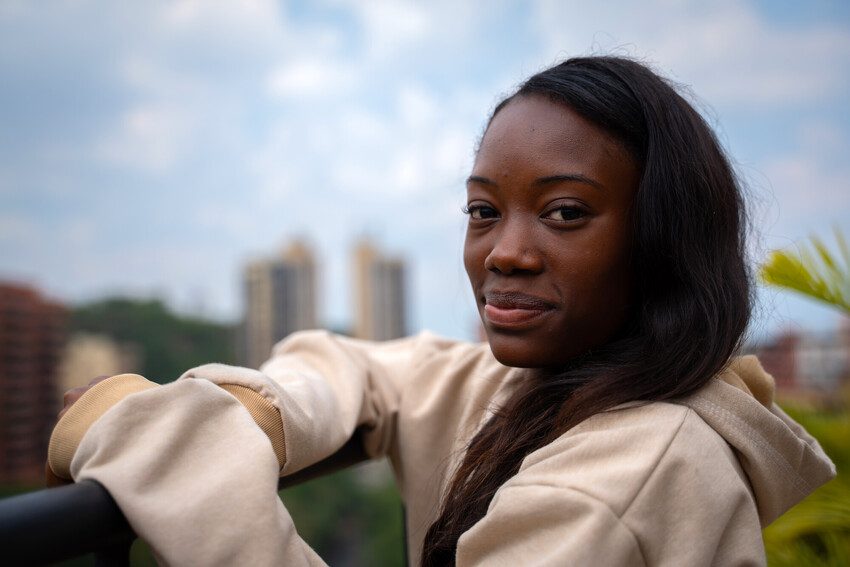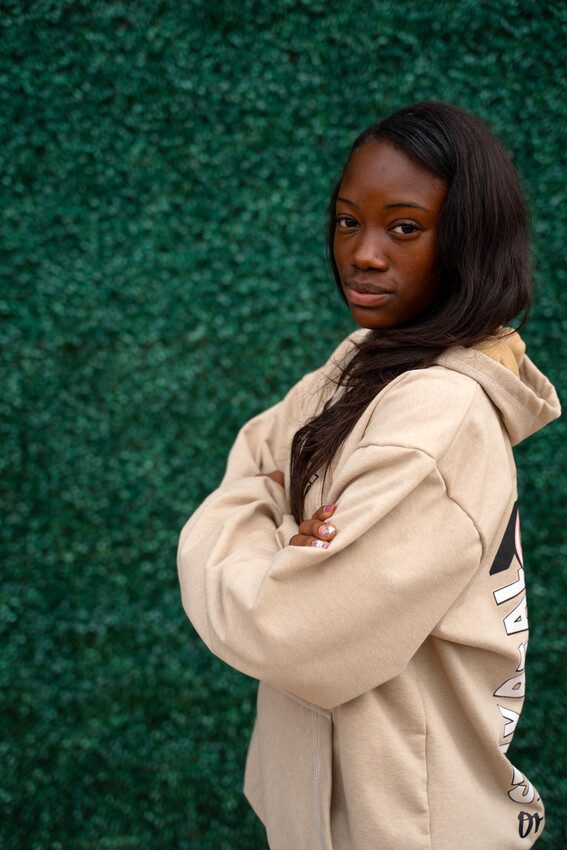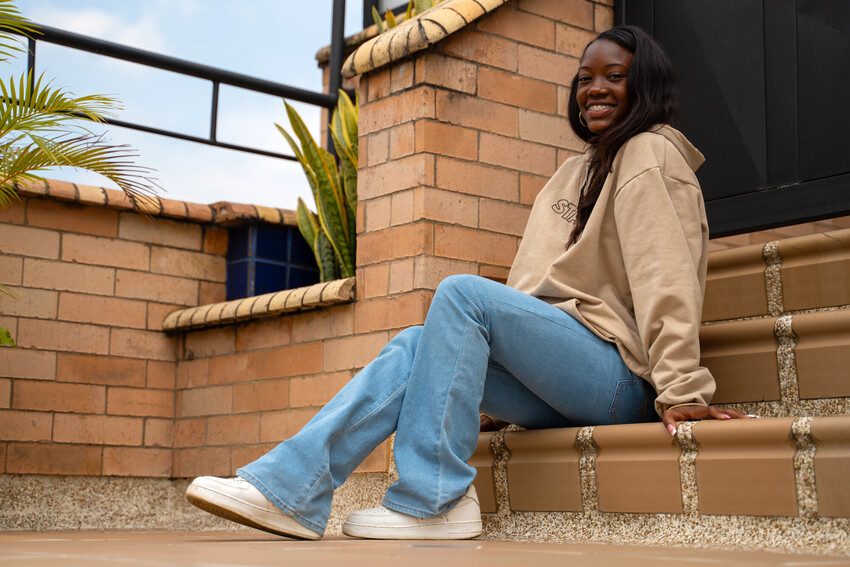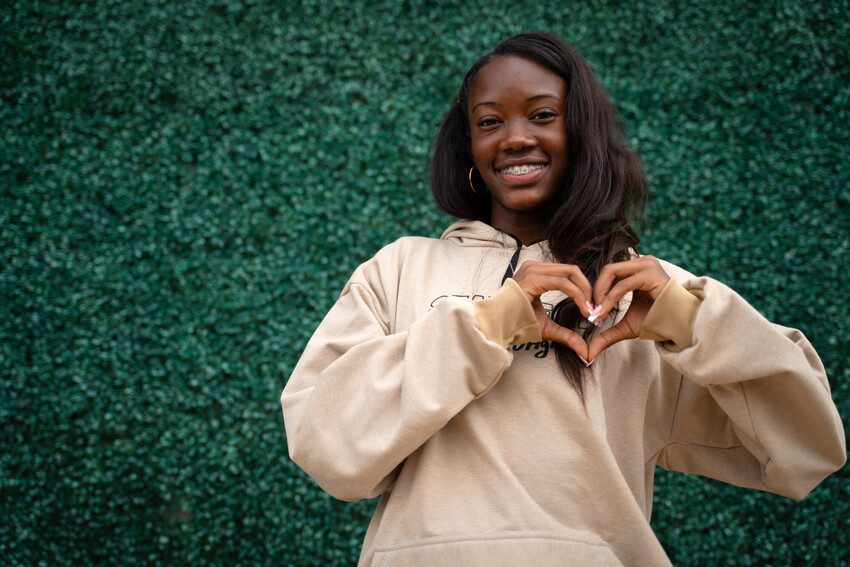Building a united community
Laubry believes communities should help each other and that young people have an important part to play. She actively participates in environmental projects to keep her community clean and prevent water shortages to build a better future for her community.

Laubry shares her story in her own words:
“My name is Laubry, I am 16 years old, and I come from the north of Cauca. I’ve lived there since I was a little girl, and it’s my place – I feel safe there. It’s where my community is, where we are all together.
“Sometimes it feels like a kind of war because there are often confrontations nearby, though not directly where my community lives. It doesn’t affect us much, but sometimes we have problems like water shortages [Unrelated to the conflict. Laubry is referring to external environmental issues in her community].”
Water shortages and conflict

“When it comes to water, our municipality is very affected. Sometimes we have to go to the rivers to fetch water to wash clothes. If someone doesn’t leave a bit of water for cooking, it becomes difficult to bathe, so we go to puddles instead. The situation with the water is very difficult.”
“We’ve lost some girls [due to conflict] – not in the main town, but around us. Children leave school, they don’t arrive home, they don’t show up. People come in vans and take them away, so we don’t know exactly who, but yes, children have been lost.”
“I feel we should help each other more as a community or as a municipality. If I see something happening, like a girl in danger, I believe the police should intervene to prevent it. We need to support each other.”
“As young people, if we want to create better futures for our communities, we need to address the issues affecting us right now. Problems won’t solve themselves; we have to act as quickly as possible.”
“For example, to prevent water shortages, we are planting trees near the aqueduct to help water reach us. But today’s young people often don’t think about resolving the challenges our community faces. There’s too much focus on oneself – people only think about themselves, not about the community or others. This is also a problem.”
“For me, peace is something very beautiful. In a country, municipality, or community where there is peace, we could all live well. There would be no wars, and we could solve our problems together because we would be united.”
Becoming a young leader
“About four years ago, I had the opportunity to join a “seedbed” project [a seedbed is a collective of children, adolescents, and young people undergoing artistic training (for artistic groups) or leadership development and participation (for social schools or community organisations)]. I started learning about subjects I didn’t know about before.”
“What attracted me the most was realising that as a child, you can still be a leader. I was impressed by the discussions about important issues like child participation in the community and sexual and reproductive rights. Those were the topics that caught my attention the most.”
“It has helped me a lot. Before, I couldn’t express myself well in front of an audience or in front of cameras. I learned to express myself and gained more knowledge about the topics I mentioned. I also started to relate better to people because, before, I didn’t like to have many relationships or share with others. But when I joined the project, I started to loosen up.”

Improving the environment for her community
“From our initiative, we created an environmental project. We used to have a rubbish bin made of materials and bottles in the municipality, which made it look very clean. But it was removed and never reappeared.”
“Contamination started again. For example, during traditional festivals, which are very common in our municipality, there was a lot of rubbish left behind. So, we decided to do something to keep the municipality clean. Our initiative was focused on the environment. We made a rubbish bin out of bottles and placed it in different locations so people could dispose of their waste properly. There were quite a few of us involved, about 20 or so.”
“I would advise women to feel confident in themselves and what they are doing. If they are in a difficult situation – for example, if a girl is kidnapped, or if they feel harassed, they should seek help from the community. They can go to the police, the justice system, or the mayor’s office. Help yourself; it’s okay.”
Empower Art for Peace project
Laubry is an active participant in the Social and Artistic School, a part of Plan International’s* Empoder Arte por la Paz (Empower Art for Peace) project.
Started in 2019, the project fosters reconciliation and peacebuilding in regions heavily impacted by armed conflict in Colombia, specifically in the North of Cauca. This project uses art and citizen participation to promote memory, peace, and equality, directly impacting the lives of over 10,000 people.

In Colombia, children and girls in conflict zones face daily threats of violence, including physical and sexual abuse. The ongoing conflict between armed groups has led to widespread instability, disrupting their education and access to basic services. Many families in regions like Cauca are forced to flee their homes due to the violence, leading to overcrowded living conditions and limited access to education and healthcare.
Girls are particularly vulnerable to gender-based violence and exploitation, exacerbating existing gender inequalities and limiting their opportunities for education and economic independence.
Educational resources and safe spaces for learning are provided to ensure that children, especially girls, continue their education despite the conflict. Protection programmes are implemented to shield children from violence and exploitation, including safe spaces and psychosocial support.
*In Colombia, Plan International is legally referred to as ‘Fundación PLAN’
Categories: Emergencies, Youth empowerment


